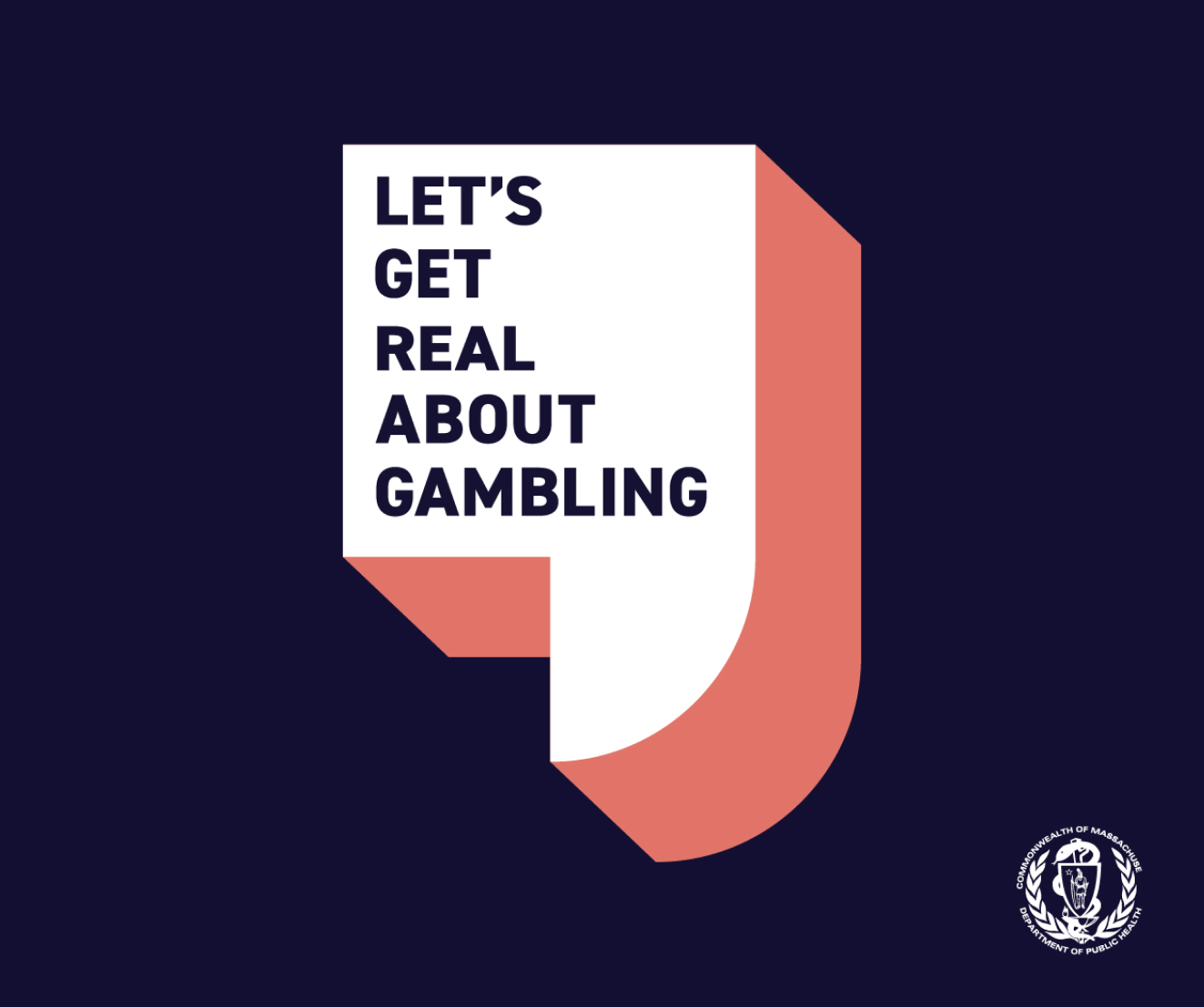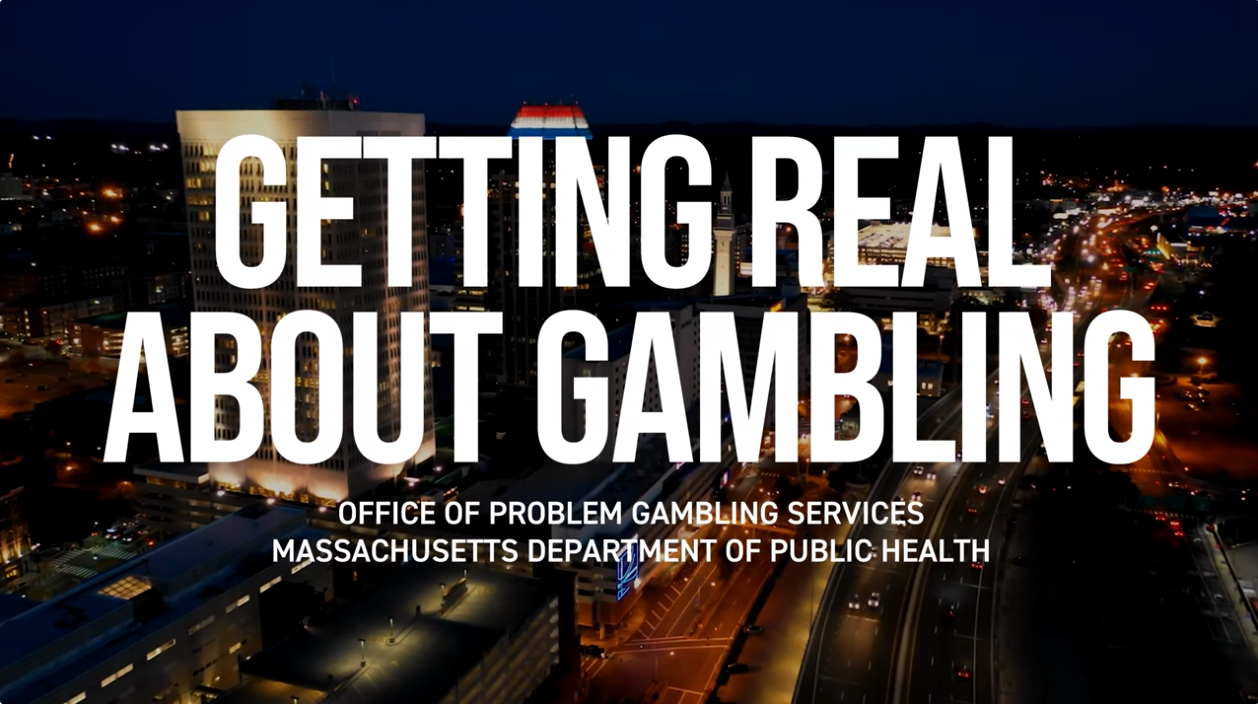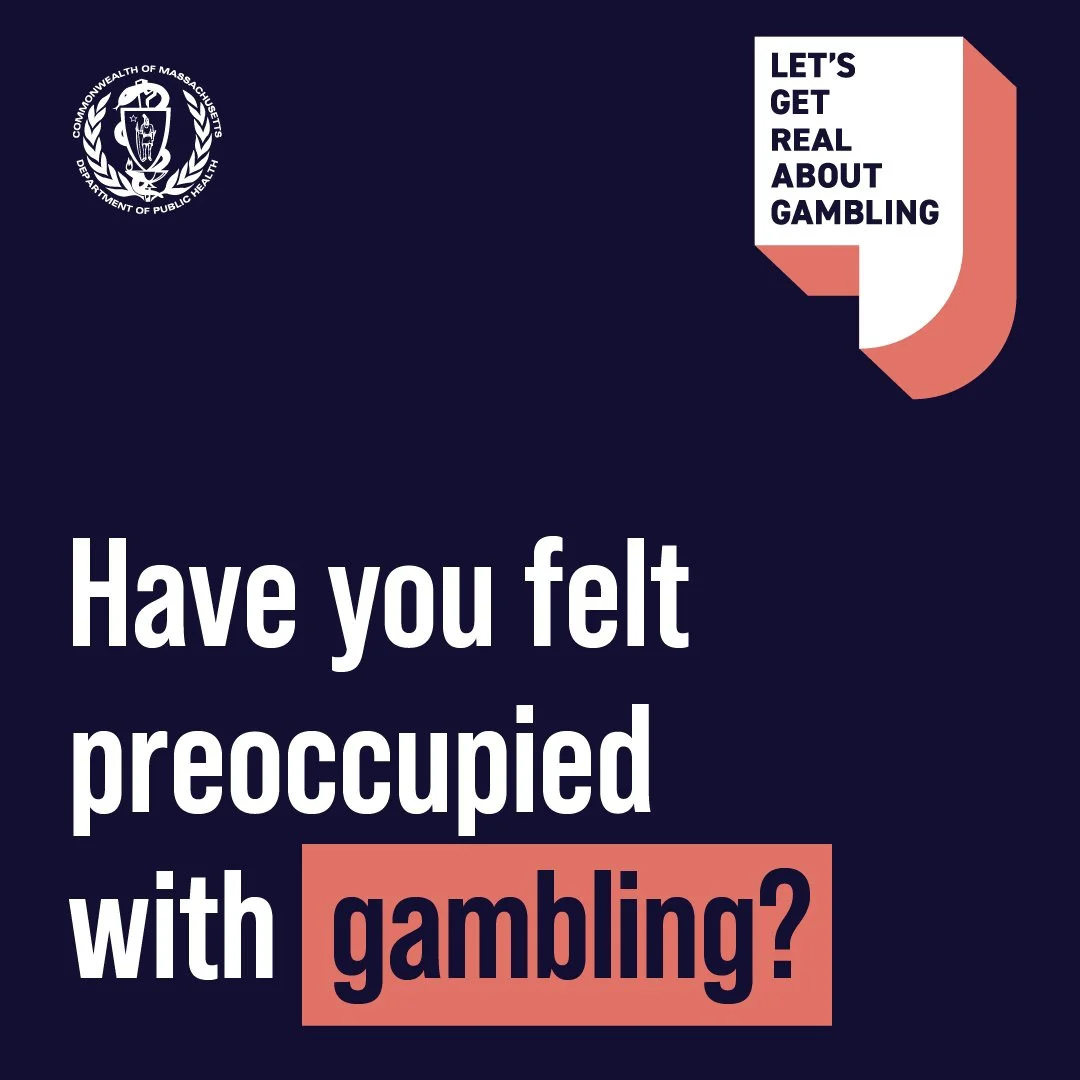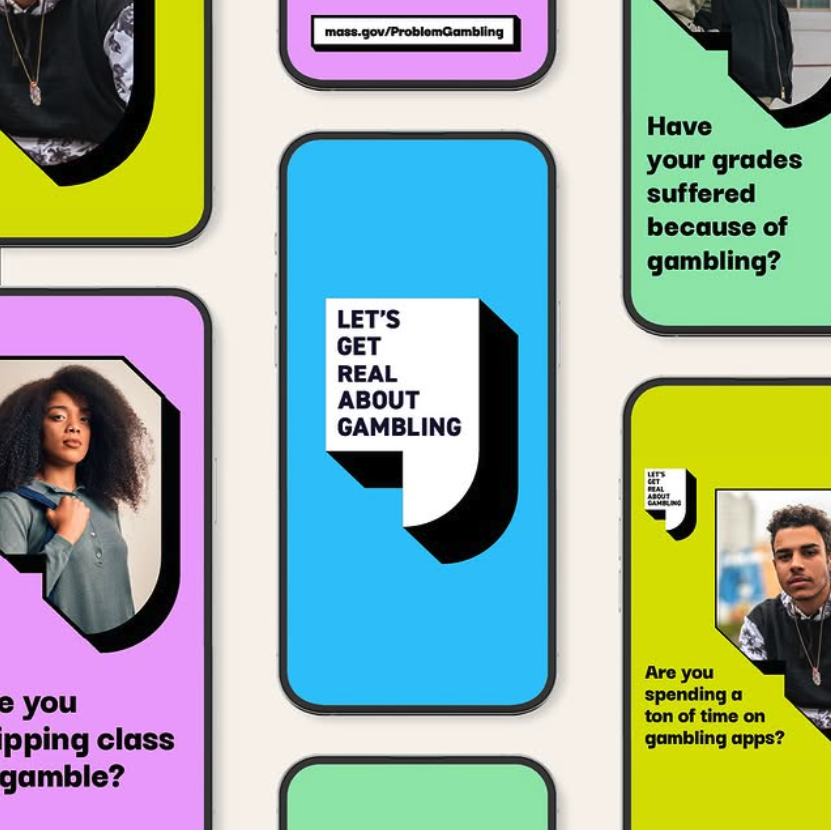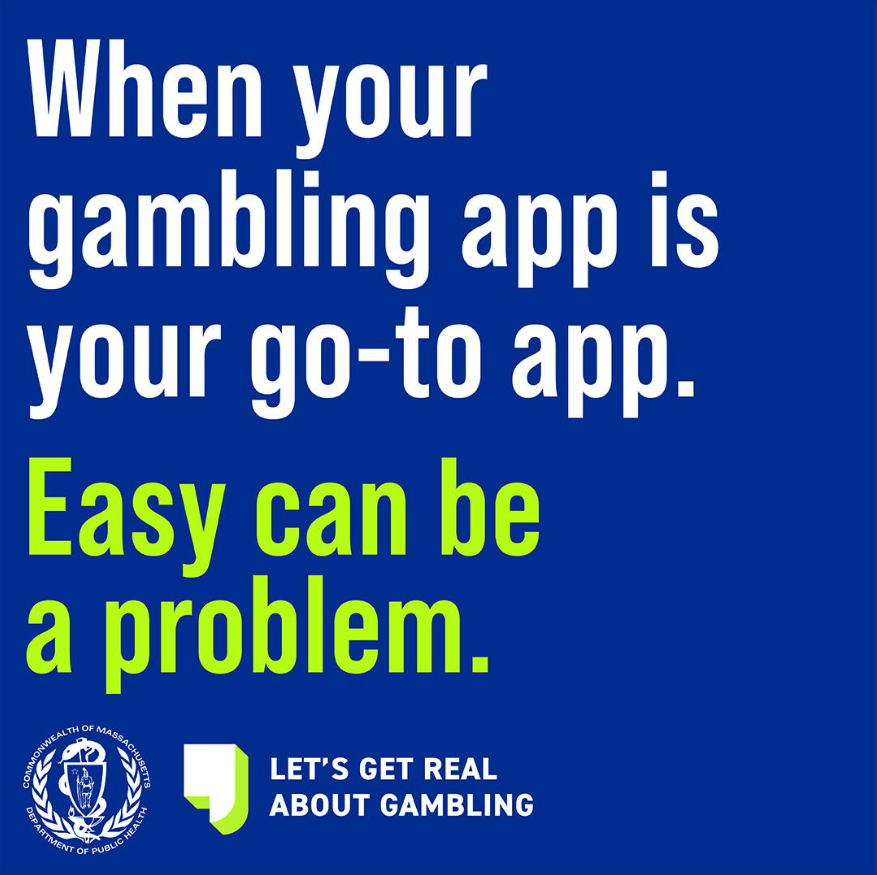Let’s Get Real About Gambling: A Social Marketing Platform
The Client: The Massachusetts Department of Public Health’s Office of Problem Gambling Services (OPGS)
The Problem
For many, gambling is a hobby or pastime. For others, it’s a serious problem. And for some of us, the risks are higher. This is why, in partnership with OPGS, we created the Let’s Get Real About Gambling platform. Our goals we’re three-fold:
First and foremost, help people identify problem gambling in themselves and the people they care about. Direct them to the resources and treatments available – especially the MA Helpline.
Secondly, go deeper to raise awareness of the risks of problem gambling, the warning signs, the relationship with public and mental health, and address issues of equity and justice.
And in the long-term, expand the societal conversation about gambling to include risk and community impact, especially for prioritypopulations. Change cultural perceptions of problem gambling from a matter of personal responsibility to a public health issue.
Current State: You Need to Be Responsible
In a culture where gambling is legal and pervasive, the main approach to preventing problem gambling is responsible gambling, which puts the onus on individuals and doesn't take into account issues of equity or social determinants of health. The public health approach is much less known or pervasive.
Desired State: Let’s Get Real
Problem gambling is understood as a public health risk, like any other addiction; and MA residents understand it as a the principal approach to problem gambling. Residents understand the co-occuring conditions of problem gambling, other addictions, and mental health conditions and see OPGS and its partners as the go-to place to learn about and resolve issues of problem gambling.
The Platform
It’s time to get real. With gambling and gambling culture normalized across Massachusetts, it’s difficult to talk honestly about mental health, individual risk, and community impact. And that’s a barrier to mounting an effective response to problem gambling, which affects tens of thousands of residents. That’s why we believe that it’s time to get real about gambling.
Getting real means addressing gambling in all its forms. It means having frank conversations about the impact of gambling and why some of us – especially people of color – are at a higher risk for problem gambling. It means making it our priority to prevent problem gambling and reduce the number of cases, not just treat those who already have a problem.
While people often talk about problem gambling as an issue of personal responsibility, we’re leading a public health approach that focuses on prevention, community resilience, and honest dialogue – and everyone has a role to play. It’s our responsibility. And the time to do it is now.
To encourage folks to get real and think differently about their gambling, we used question-based ads to promote self-reflection:
Building on this platform, we worked on a series of campaigns targeted towards “getting real” with priority populations that are at higher-risk of developing problem gambling:
Gambling content is everywhere, all the time. For many college kids, it feels like everybody’s doing it. But for some, gambling is not a fun, social activity. Nearly a third of college gamblers will spend less on food or will build credit card debt to fund their gambling habits. Some will delay paying bills or take fewer classes to have more money available for betting. The reality is, college students aren’t actively talking about whether their gambling is a problem. That’s why we partnered with the Office of Problem Gambling Services at the MA Department of Public Health to craft a campaign encouraging young adults to ask themselves, and each other, the hard questions.
Our goal was to change the narrative around gambling among 18-24 year olds – to reduce the stress and anxiety of navigating problem gambling, lessen peer pressure around recreational gambling, and equip college kids to recognize an addiction before it starts.
Asian American communities in Massachusetts are disproportionately impacted by problem gambling. They’re highly targeted by casinos, taking advantage of cultural attitudes around gambling and the lack of other culturally appropriate entertainment options. Social isolation, stigma around mental health and financial issues, and distrust of outsiders make it difficult to talk openly about the risks and realities of problem gambling at the individual, family, and community levels. This has made too many Asian Americans suffer from problem gambling in silence.
Proof Points:
Problem gambling, among other health conditions, is not discussed openly in Asian American communities and there is intense shame and stigma associated with seeking help, or developing a problem in the first place.
Shame and stigma live at the individual and family levels and are deeply intertwined with and furthered by each other. Asian American families are greatly affected by problem gambling but they are also a big part of the solution to problem gambling and can serve as our greatest change-makers.
There’s a lack of linguistically accessible entertainment options for Asian American communities in Massachusetts, which worsens feelings of isolation for recent immigrants and older adults. Many regularly gamble, turning to casinos for fun and an escape from isolation.
Asian American communities are geographically concentrated within a 15 miles radius around the casinos, more so than any other population. And the casinos in Massachusetts are acting on this, using predatory practices and targeted marketing to keep these gamblers seen and satisfied, and profits steady.
Most Asian Americans come from cultures that value social gambling as a way of connecting with community, celebrate luck and fortune, but look down on sharing vulnerability.
Change Goal: Reduce cases of problem gambling in Asian American communities that are particularly impacted by legalized casino gambling in Massachusetts.
Marketing Objectives: Raise awareness in Asian American communities of problem gambling as a public health issue and normalize open conversations about gambling with family and other support systems.
Our Vision: Problem gambling and its risks are an essential part of the community's conversation about gambling. There's high awareness of and engagement with culturally relevant, accessible, trusted support resources and individuals in the community are able to have open conversations with friends and family about their/others gambling before conditions get critical.
Campaign Approach: It’s Time to Talk About the Risk.
In every community, there are things we talk about not because we want to, but because we have to. For too long, we’ve let others lead the conversation about gambling. That has to change. Gambling is not all about entertainment. There’s always a risk and sometimes it’s families who pay the price. To protect ourselves, we need to be open and honest about problem gambling.
Key Messages:
Gambling can make people feel withdrawn, depressed, and disconnected from their family, friends, and community. It can get you in legal trouble and hurt you and your loved ones financially. A gambling problem can have as big an impact on your life as an alcohol or substance use problem.
Problem gambling is a health condition that can happen to anyone. Talking openly about the risks is the only way to protect ourselves.
Casinos can be exciting and entertaining. But even if it starts as a fun pastime, gambling can become a major problem, one that can a harm the whole family.
When it comes to problem gambling, you’re not alone. Many families like yours are dealing with problem gambling every day. Reaching out is the first step to make things better.
There are many ways to make friends and be social. Casinos are not your only option. Learn more about all the great things your community has to offer.
After just a few years of legalized sports betting, the data shows that those making bets are most likely to be Men in their 20s. Thanks to heavily targeted and widely spread industry advertising, young men are engaging with gambling more than ever and are increasingly at risk of developing problem gambling.
Men in their 20s see sports betting as the cool, new way to watch sports and hang out with their “boys.” By placing small bets throughout the span of a game, in the presence of friends, young men see their gambling as casual and controlled. And many believe that the odds are more in their favor, compared to other forms of gambling—especially for those who play or watch sports regularly. But the numbers say otherwise. And the more this social betting culture is normalized, the harder it could become for young men to see problem gambling for what it is, raise concerns, and get the help they need.
Everywhere you look these days, you’re served a sports-betting ad—likely one with a misleading promise of rewards, and a celebrity cameo. It’s on your social media, all over your commute, and aired on TV during every commercial break. It feels like everybody’s doing it. While the excitement of playing and winning is shared, unspoken social norms often keep individuals from sharing their concerns and challenges. Moreover, young men are already at higher risk for problem gambling, due to their still-developing prefrontal cortex which leaves them predisposed to addiction. The fact is: it only takes ~66 days for a behavior to become a habit, which is less than half the length of a single sports season.
Proof Points:
For men in their 20s, gambling is seen as a fun way to bond.
Sports betting is the most common form of gambling amongst this demographic.
Industry behavior, coupled with ongoing brain development, puts men in their 20s at risk of problem gambling.
Most say they would turn to family or friends for help, and would support a friend who is struggling with gambling.
Change Goal: Shift perceptions of the risks and realities of problem gambling amongst men in their 20s; and reduce incidence of gambling related-harm among men in their 20’s.
Marketing Objective: Equip men in their 20s to recognize the risks and warning signs of problem gambling; and normalize open and frequent conversations between men about problem gambling.
Strategic Approach: Huddle Up to Change the Play
Take that group-mentality and flip it on it’s head. Use these same social bonds that keep younger men from speaking about their concerns to generate a shared sense of responsibility. We can leverage trusted friendships to help men in their 20s navigate the risk of problem gambling. We’ll equip them with tools they need to be there for their buddies when there is a problem, or even when they think there might be. And for those that are struggling, we’ll make sure they know they can and should talk openly and honestly with their friends; and connect them to OPGS resources and support, before things escalate from a pastime to a problem. This is how we’ll strengthen their awareness, and their friendships, and set them up to win, where it counts.
Key Messages:
It’s time to huddle up: It feels like sports betting is everywhere, all the time. Because it is. Even when we aren’t watchin a game, it’s on our social media, all over our commute, and on our TVs. And we can’t wait around or temptations to fade, because they won’t. It’s time to call a team huddle.
It takes a whole team: Many people sportsbet without a problem. But we’re concerned about those of us at higher risk. And it’s up to all of us to protect each other—to promote acts, remove barriers, and build resilience. Everyone has a role to play when it comes to reducing and preventing problem gambling. Let your friends know they don’t need to bet to belong.
See a foul, call a flag: When something seems off, or you or your friends, take a moment to check in. Because getting real about gambling beore it becomes a problem, and leaning on each other or support, is the best way we can protect ourselves and our community.
You can leave gambling on the sidelines: We don’t need to bet on sports in order to enjoy watching them. And if we aren’t into a game, it’s better to turn it off than to open the betting app. Because sometimes sports can be more fun when we aren’t worried about losing.
Losing is part of the game: Just because gamblin is now more accessible and part of somethin we know and love, doesn’t mean our odds have chaned. It’s still a risk, rather than a matter o personal responsibility or skill. When it comes to other health conditions, we don't assume that we can control the outcome. So we shouldn’t when it comes to gambling.
Campaign Message: Easy Can Be a Problem
Agency: Argus
